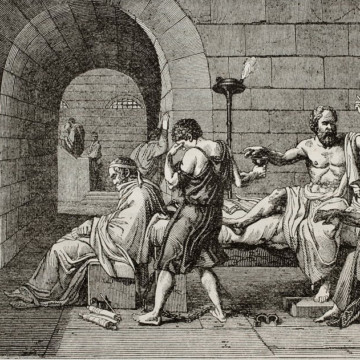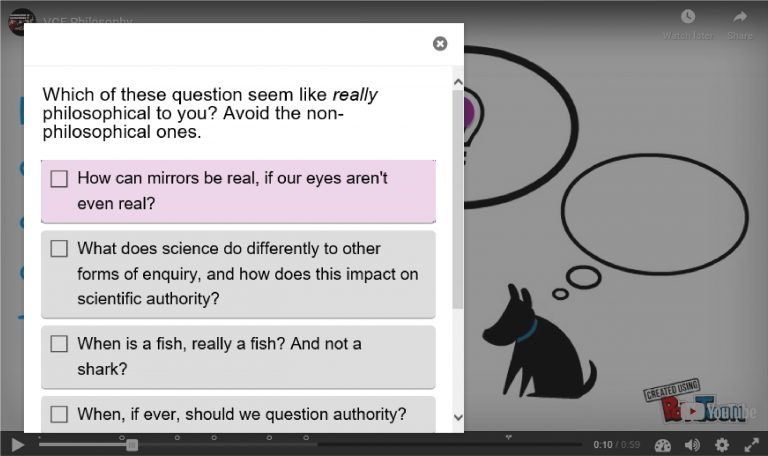

Year 12 Philosophy Units 3 and 4
Overview
Philosophy is the investigation of some of the deepest questions that confront human beings. For example, in Units 3 and 4 we consider questions such as:
- Can the mind be identified with the brain?
- When is somebody no longer the same person that they once were?
- What does the very best life for a human being look like?
- How do contemporary issues relating to technology relate to living a good life?
Who is it for?
Philosophy is ideal for those who ask ‘why’ a lot; those who wonder about life, about right and wrong, about freedom, truth, beauty and a thousand other things. It is for those who want to confront difficult questions and develop the skills required to make rational judgments about them.
What do you do?
In Philosophy, you explore some of the deepest questions and the disagreements they generate. You tackle some of the greatest philosophical thinkers from history. You learn how to craft stronger arguments, and how to think critically about your own preconceptions.
In Unit 3 and 4, you must make choices. You choose how deep you want to go exploring an idea or argument, through readings and videos within the course. You must balance how much time you spend pursuing interesting philosophical thoughts and preparing for School-assessed Coursework tasks. You cannot learn everything in Philosophy, so you must decide how you will manage your time each week.
You open up a world of new ideas that may change the way you see everything else. It may change you.
What skills do you need?
Studying Unit 1 or 2 Philosophy helps, but is not required.
Philosophy students should enjoy reading and rereading texts. You should enjoy developing and improving your own view with others. You must understand that in Philosophy it is never sufficient just to give an opinion: you need to give reasons for why anyone else should agree with you.
You should have the courage to tackle difficult ideas, and to be okay with not knowing everything. The courage to ask for help, and to explore beyond your comfort zone.
Lastly, you must have the personal integrity to be willing to give up a treasured belief if you are given convincing evidence that it is false.
What skills do you develop?
In interrogating your own beliefs, you work towards becoming your own person – someone who can reason through a difficult problem, and who can justify what they are doing and for what purpose.
Philosophy, as one of the oldest academic disciplines, fosters the development of some very specific skills: particularly, the recognition, analysis, evaluation and creative production of arguments. These skills can be found in other areas of thought: this is because deep behind every other intellectual pursuit lies philosophical questions, assumptions or reasoning.
Also, you cannot do it alone – in Philosophy, you must work with your classmates and teachers to figure out influential arguments, question, respond to objections, and consider the implications. We use online activities and classes to share our thinking and learn from each other.
Requirements
This is an online course and Philosophy students will require regular, stable access to the internet.
Unit 4 set texts are:
- Nietzsche, Friedrich, 2003, Beyond Good and Evil, trans. Hollingdale, R.J, Penguin Classics, (ISBN: 9780140449235)
- Plato, 2008, Gorgias, trans. Waterfield, R, Oxford World’s Classics, Oxford University Press (ISBN 978-0-199-54032-7)
- Aristotle, 2009, The Nicomachean Ethics, trans. Ross, D, ed. Brow, L, Oxford World’s Classics, Oxford University Press (ISBN 978-0-199-21361-0)
- Wolf, Susan, 2010 (reprinted 2012) Meaning in Life and Why it Matters, Princeton University Press (ISBN: 978-0-691-15450)
These texts are available in the course and do not need to be purchased by students.
For the complete Unit 3 and 4 text list and further information on the subject, please visit the following page on the VCAA website.
Things to think about
If you do not like the idea of challenging some of the most influential, dense and difficult arguments made throughout history, you should find another subject. Likewise, if you don’t like reading, writing, or negotiating ambiguity, then this isn’t the subject for you. Students should be prepared for Philosophy to forever change the way that they see life. You will not come out of this subject the same. You have been warned!
Things you can do now
There is a basic logic component to this course. Students can hone their logic skills in preparation for the intellectual rigors to come by working through the Critical Thinking Web’s Identifying Arguments module.
Go to the VCAA website for more information about this subject.
Things to have a look at
‘Why Study VCE Philosophy?’

https://h5p.org/node/287596
Is VCE Philosophy right for you? Watch this video and answer these questions to help you figure it out.
VSV Philosophy Students
Some former VSV Philosophy students discussing Unit 3 Outcome 1 topcis: Mind Body and Soul
Philosophy Lego Range
A short parody video explaining the point of a Lego philosopher (minifigure not included upon enrolment in the course)